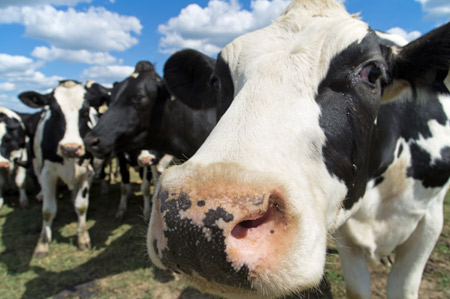Dairy prices drop further, despite falling New Zealand output
Category: Dairy
 (Agrimoney) – Commodity milk markets continued to fall, as prices on the GlobalDairyTrade auction site dropped for the third event in a row.
(Agrimoney) – Commodity milk markets continued to fall, as prices on the GlobalDairyTrade auction site dropped for the third event in a row.
Milk prices on the auction site, which is run by New Zealand milk giant Fonterra, were down 7.9% from the previous event, held at the start of the month.
But despite the recent fall, prices remain 35% above their August lows.
A bearish market
The sharpest declines were seen in whole milk powder prices, which fell by 11% from last event.
“Not a lot of people will be surprised,” said Tom Bailey, dairy analyst at Rabobank.
“Fundamentals are driving a bearish market,” he said.
“The negotiation power in the hands of buyers – they’ve got a lot of stock and they have negotiating powers.”
New Zealand production eases
Dairy production has been easing in New Zealand, as prices paid to farmers fall in response to lower global commodity milk prices.
On Monday, Fonterra announced that New Zealand milk output was down 4.2% in October, the peak month for output, and forecast a drop of at least 5% over the 2015-16 season.
“New Zealand got the signal,” said Mr Bailey.
“Structurally their milk price is so linked to commodity milk prices.”
Dutch support
But in Europe and North America, farmers have seen less incentive to cut production.
This month the Dutch dairy co-operative FrieslandCampina lifted the milk price paid by farmers to by E0.75 per 100kg to E29.75, citing a stronger market for diary productins in Germany.
“That’s a signal to Dutch farmers that things are improving,” said Mr Bailey.
“In order for the market to recover we need to see European and US production slow,” he said.
“New Zealand cannot correct this market alone.”
Chinese policy
Falling milk prices came despite hopes that a shift in Chinese policy would support long term demand.
Last month China announced that it would be bringing its decades old one-child policy to an end.
The government said that couples would now be allowed to have a second child, with government approval, but did not state when the policy would be implemented.
The move, which is intended to tackle the problem of a rapidly aging population, will be a boost for infant formula demand, Rabobank said.
Rising demand
Rabobank said that the change in Chinese policy could increase the number of newborn babies in China by 16.6% a year over the next five years.
“Assuming also that the current breastfeeding ratio of 28% remains unchanged for the second child, Rabobank initially estimates that the IMF market could be boosted by about the same 16.6% a year—equivalent to about 117,000 tonnes a year,” the bank said.
Rabobank said this shift could lift its current forecast for demand growth for infant formula of 7-8% over the next five years by 3-4 percentage points.
A subtle impact
But Rabobank downplayed the effects of the move on global milk prices.
“IMF accounts for only about 4% of dairy consumption in China (liquid milk equivalent), so the impact on dairy farmers via this channel is negligible.
“It’s not going to be a major upside driver in the short term,” said Mr Bailey, expecting “only a subtle impact”.




